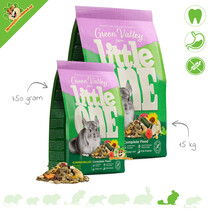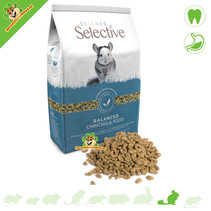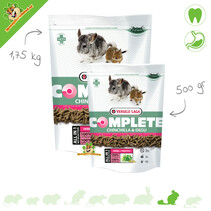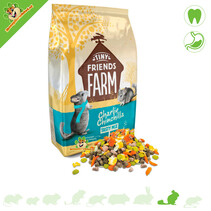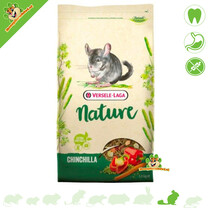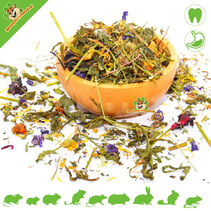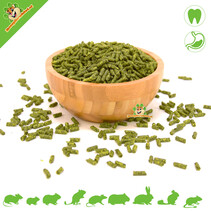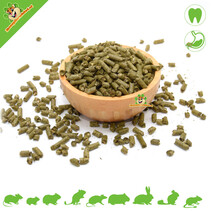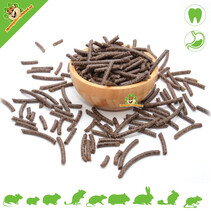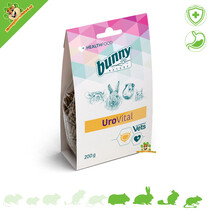Chinchilla food in the Chinchilla Webshop
- Ordered before 5 p.m., shipped the same day!
- Al 14 jaar een begrip!
- Delivery from our own stock
- Ordered before 5 p.m., shipped the same day!
- Al 14 jaar een begrip!
- Delivery from our own stock
You can order chinchilla food quickly and easily at DRD Rodent Shop ® The Chinchilla Webshop your Chinchilla!
Order chinchilla food for your Chinchilla easily and quickly at DRD Rodent Shop. Do you want to spoil your Chinchilla with healthy, balanced chinchilla food? You will find various types of food here for an attractive price. Versele-Laga, Witte Molen, Hope Farms, Supreme etc. Ordering is easy and fast at DRD Rodent Shop!
Chinchillas are small, folivorous/herbivorous (plant-eating) mammals and belong to the order of rodents. Chinchillas feed on plant food and are able to process it optimally.
Teeth
There are two incisors in each of the upper and lower jaws, which, like the molars, continue to grow throughout life. A rough fiber structure in the diet is necessary for tooth wear.
Stomach
The stomach is only moderately muscular and therefore cannot transport the food pulp to the next section of the intestine on its own. The following food portions take over that task.
appendix
Fine dietary fibres end up in the voluminous appendix, which are converted into proteins, vitamin B complex and vitamin K by special bacteria. That is why the appendix is also called the fermentation chamber. The formed appendix pellets are reabsorbed by chinchillas.
Ratio of crude fiber and starch
Crude fibers: Crude fibers are very important for health. They support digestion, the appendix and with their rough fiber structure, tooth wear.
Starch: Starch is mainly an energy supplier and should be present in limited quantities in the feed.
A shift in the crude fiber-starch ratio can lead to long-term health damage:
Too little crude fibre leads to intestinal sluggishness, changes in intestinal flora and disturbed functioning of the appendix.
Too much starch leads to eating pauses, changes in intestinal flora, swelling, diarrhea, fermentation, obesity.
That is why veterinarians recommend a minimum crude fiber to starch ratio of 3:1.
How do I actually know how much starch my food contains?
The composition is very useful: whole grains (with starchy endosperm), field beans, potatoes or peas are an indication that a higher starch content should be taken into account.
Chinchillas have a very sensitive digestive system. The food should not contain too much moisture. In addition to special chinchilla pellets, chinchillas need unlimited hay. Chinchillas eat their cecal feces, just like rabbits. They mainly get vitamin B12 from this. In the wild, the chinchilla eats dried plant parts. The food should be low in energy and rich in fiber. The chinchilla's gastrointestinal tract is weakly muscled. The chinchilla should therefore not have too long eating breaks. Hay in particular should be available in unlimited quantities.
Fibers: Fibers are extremely important for chinchillas. The teeth and molars of the chinchilla grow throughout their life. It is therefore important that the teeth and molars wear down sufficiently. This is done by eating rough fibers, mainly from hay. By chewing on the long fibers from the hay for a long time, the chinchilla produces saliva. This saliva contains enzymes that start the digestion. In addition to wearing down the teeth and molars, fibers are also important for digestion.
Protein: The food should not contain too much protein. The appendix feces must be eaten by the chinchilla. This is rich in vitamins and protein. If the chinchilla gets too much protein through its food, this can cause it to no longer eat the appendix feces.
Fats: Chinchillas should not eat too much fat. If the food contains too much fat, this can cause the chinchilla to take eating breaks. This can lead to digestive problems. A food that is too fatty can also cause the chinchilla to become too fat.
Calcium: The chinchilla excretes excess calcium via the faeces, and not via the urine as is the case with many other rodents. This significantly reduces the risk of bladder and kidney stones. An excess of calcium is therefore not directly dangerous. A calcium deficiency is harmful to the teeth and skeleton. Young animals that are growing and pregnant animals need a calcium content of 0.9%. For adult animals, a content of 0.6% is sufficient. The calcium:phosphorus ratio should be between 1.5:1 and 2:1.
These plants can be eaten by chinchillas
Wild Plants |
Branches and Leaves |
Vegetables |
|---|---|---|
| Strawberry leaf Bindweed Amaranth Mountain savory Mugwort Buckwheat Chives Nettle (dried) Goldenrod Canadian fine-ray Wild garlic Dead Nettle Yarrow Speedwell Angelica Cow parsley Great Wall Plantain Cat's tail Large poppy Common agrimony Marigold Common pigweed Regular rocket Common Hogweed Hedge bindweed Horsetail Herik pigeonhole Ground Ivy Shepherd's purse Hop Hawkweed Horn flower deer hay Hedge vetch Incarnate clover Japanese knotweed Mallow/Malva Chamomile Cleavers Nodding avens Knotweed Knotweed Borage Compass lettuce Queen Anne's Lace Rapeseed Cornflower blue Cornflower Red Coltsfoot Clover Wood sorrel Burdock Look-without-look Sweet pea violet Daisy Marguerite Report Milk Thistle/Lady Thistle Avens stork's bill Dandelion Bee bread Arrowhead Cress Pennywort Pimpernel Bird's-foot trefoil Comfrey Coleus Runner seed Narrow-leaved plantain Evening primrose Torch Valerian Lamb's lettuce Field cress Cinquefoil Vetch Chickweed Toadflax Lady's mantle Bedstraw Chicory Wild carrot Winter purslane White Krodde White watercress Black Green Ground elder Silverweed Sunflower Coneflower/Echinacea Sorrel |
Currant bush |
Endive Celery Broccoli Zucchini Iceberg lettuce Cucumber Lettuce Bell pepper Parsnip Parsley root Pumpkin Purslane |





